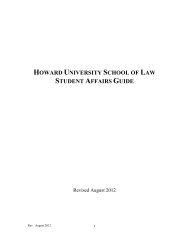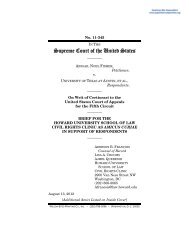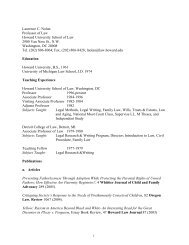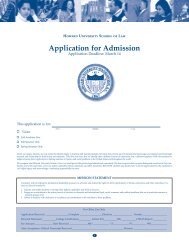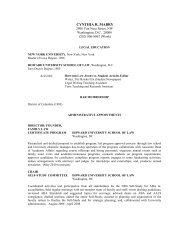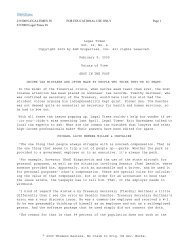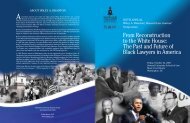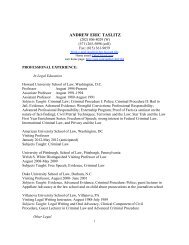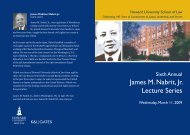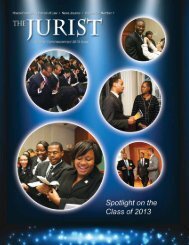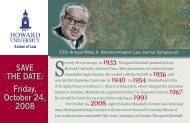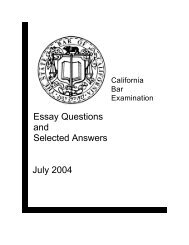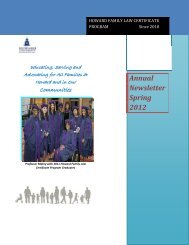- Page 1: Business InformationSUBSCRIPTIONS:
- Page 6 and 7: UNCLE SAM V. NAPOLEON: WHO OWNS THE
- Page 8 and 9: Cyberbullying and Privacy Law and I
- Page 10 and 11: Howard Law Journal4. Statements by
- Page 12 and 13: Howard Law Journal“problem arises
- Page 14 and 15: Howard Law Journalto sell the war j
- Page 16 and 17: Howard Law Journal(4) . . . [S]ymbo
- Page 18 and 19: Howard Law JournalCongress granted
- Page 20 and 21: Howard Law Journalthose who he “d
- Page 22 and 23: Howard Law Journalties. 64 On other
- Page 24 and 25: Howard Law Journal“harboring” p
- Page 26 and 27: Howard Law Journalhumanitarian inte
- Page 30 and 31: Howard Law Journalsive speech with
- Page 32 and 33: Howard Law JournalAmerican public i
- Page 34 and 35: Howard Law Journal2001, Vice Presid
- Page 36 and 37: Howard Law JournalSeptember 11th.
- Page 38 and 39: Howard Law Journalof Iraq as a part
- Page 40 and 41: Howard Law Journalinformation with
- Page 42 and 43: Howard Law Journalhow stereotyped i
- Page 44 and 45: Howard Law Journalweapons to terror
- Page 46 and 47: Howard Law Journalrepeated statemen
- Page 48 and 49: Howard Law Journalhe himself about
- Page 50 and 51: Howard Law Journalthat’s why what
- Page 52 and 53: Howard Law JournalPresident Reagan
- Page 54 and 55: Howard Law Journalthat has an activ
- Page 56 and 57: Howard Law Journallucid in Bush adm
- Page 58 and 59: Howard Law Journalheuristics, rathe
- Page 60 and 61: Howard Law JournalFirst Amendment d
- Page 62 and 63: Howard Law Journalthat foster the p
- Page 64 and 65: Howard Law Journalogy, and values c
- Page 66 and 67: Howard Law Journalon terror,” Att
- Page 68 and 69: Howard Law Journalmany of them vote
- Page 70 and 71: Howard Law JournalWe know that Sadd
- Page 72 and 73: Howard Law Journalmoved every one t
- Page 74 and 75: Howard Law JournalBush warned, “T
- Page 76 and 77: Howard Law Journalin chemical and b
- Page 78 and 79:
Howard Law Journalernment language.
- Page 80:
Howard Law Journaldon’t want the
- Page 83 and 84:
Cognitive Foreign Policyon December
- Page 85 and 86:
Cognitive Foreign Policytional resp
- Page 87 and 88:
Cognitive Foreign Policytriotism an
- Page 89 and 90:
Cognitive Foreign Policyerence exis
- Page 91:
Cognitive Foreign Policyunconfirmed
- Page 94 and 95:
Howard Law JournalCourt. Finally, S
- Page 96 and 97:
Howard Law JournalLouis Brandeis, 8
- Page 98 and 99:
Howard Law JournalStone—an appoin
- Page 100 and 101:
Howard Law Journalmisjudged him. De
- Page 102 and 103:
Howard Law Journalfields of law. He
- Page 104 and 105:
Howard Law JournalFrankfurter, Jack
- Page 106 and 107:
Howard Law Journalinclude adhering
- Page 108 and 109:
Howard Law Journaltion to surveilla
- Page 110 and 111:
Howard Law Journalabuses during the
- Page 112 and 113:
Howard Law JournalFelix Frankfurter
- Page 114 and 115:
Howard Law JournalThe AAA was desig
- Page 116 and 117:
Howard Law JournalFinally, Stone ad
- Page 118 and 119:
Howard Law Journalwho do not purcha
- Page 120 and 121:
Howard Law Journalagain, the Court
- Page 122 and 123:
Howard Law Journalabout the Tax and
- Page 124 and 125:
Howard Law Journalprice, wage, and
- Page 126 and 127:
Howard Law Journalthe Court’s inv
- Page 128 and 129:
Howard Law JournalStone, who recogn
- Page 130 and 131:
Howard Law JournalStone expressed i
- Page 132 and 133:
Howard Law Journalgrounds, to parti
- Page 134 and 135:
Howard Law Journalit did explicitly
- Page 136 and 137:
Howard Law JournalRecent reexaminat
- Page 139 and 140:
The Search for an EnvironmentalFila
- Page 141 and 142:
The Search for an Environmental Fil
- Page 143 and 144:
The Search for an Environmental Fil
- Page 145 and 146:
The Search for an Environmental Fil
- Page 147 and 148:
The Search for an Environmental Fil
- Page 149 and 150:
The Search for an Environmental Fil
- Page 151 and 152:
The Search for an Environmental Fil
- Page 153 and 154:
The Search for an Environmental Fil
- Page 155 and 156:
The Search for an Environmental Fil
- Page 157 and 158:
The Search for an Environmental Fil
- Page 159 and 160:
The Search for an Environmental Fil
- Page 161 and 162:
The Search for an Environmental Fil
- Page 163 and 164:
The Search for an Environmental Fil
- Page 165 and 166:
The Search for an Environmental Fil
- Page 167 and 168:
The Search for an Environmental Fil
- Page 169 and 170:
The Search for an Environmental Fil
- Page 171 and 172:
The Search for an Environmental Fil
- Page 173 and 174:
The Search for an Environmental Fil
- Page 175 and 176:
The Search for an Environmental Fil
- Page 177 and 178:
Mean Girls and Boys: The Intersecti
- Page 179 and 180:
Mean Girls and Boysher parents, old
- Page 181 and 182:
Mean Girls and BoysTwitter posts, t
- Page 183 and 184:
Mean Girls and Boysaway from the si
- Page 185 and 186:
Mean Girls and Boysspeak anonymousl
- Page 187 and 188:
Mean Girls and BoysTwitter, or othe
- Page 189 and 190:
Mean Girls and Boysestimated to hav
- Page 191 and 192:
Mean Girls and Boysphysical attack,
- Page 193 and 194:
Mean Girls and Boyslies have been s
- Page 195 and 196:
Mean Girls and Boys1986. 104 On Nov
- Page 197 and 198:
Mean Girls and Boysstandardizes lif
- Page 199 and 200:
Mean Girls and Boysand unpleasantne
- Page 201 and 202:
Mean Girls and BoysFirst Amendment
- Page 203 and 204:
Mean Girls and Boysdecision holding
- Page 205 and 206:
Mean Girls and Boysthe information
- Page 207 and 208:
Mean Girls and Boyshide behind pseu
- Page 209 and 210:
Mean Girls and BoysV. WHAT CAN BE D
- Page 211 and 212:
Mean Girls and Boysthat text messag
- Page 213 and 214:
Mean Girls and Boystheir actions ar
- Page 215 and 216:
A New Regionalist Perspective on La
- Page 217 and 218:
A New Regionalist PerspectiveLand u
- Page 219 and 220:
A New Regionalist PerspectiveThis r
- Page 221 and 222:
A New Regionalist Perspectivethat w
- Page 223 and 224:
A New Regionalist Perspectiveently
- Page 225 and 226:
A New Regionalist PerspectiveAlthou
- Page 227 and 228:
A New Regionalist Perspective3. The
- Page 229 and 230:
A New Regionalist Perspectiveties.
- Page 231 and 232:
A New Regionalist Perspectivesame r
- Page 233 and 234:
A New Regionalist Perspectiveoften
- Page 235 and 236:
A New Regionalist Perspectivethat s
- Page 237 and 238:
A New Regionalist Perspectivedistri
- Page 239 and 240:
A New Regionalist Perspectiverecogn
- Page 241 and 242:
A New Regionalist Perspectivepansiv
- Page 243 and 244:
A New Regionalist Perspectiveaccord
- Page 245 and 246:
A New Regionalist Perspectivethe mo
- Page 247 and 248:
A New Regionalist Perspectiveeffect
- Page 249 and 250:
A New Regionalist Perspectiveregime
- Page 251 and 252:
A New Regionalist Perspectivethe gr
- Page 253 and 254:
A New Regionalist Perspectivegrate
- Page 255 and 256:
A New Regionalist PerspectiveAlthou
- Page 257 and 258:
A New Regionalist PerspectiveCounte
- Page 259 and 260:
A New Regionalist Perspectivefore,
- Page 261 and 262:
COMMENTToward a System of Least Res
- Page 263 and 264:
Toward a System of Least Restrictiv
- Page 265 and 266:
Toward a System of Least Restrictiv
- Page 267 and 268:
Toward a System of Least Restrictiv
- Page 269 and 270:
Toward a System of Least Restrictiv
- Page 271 and 272:
Toward a System of Least Restrictiv
- Page 273 and 274:
Toward a System of Least Restrictiv
- Page 275 and 276:
Toward a System of Least Restrictiv
- Page 277 and 278:
Toward a System of Least Restrictiv
- Page 279 and 280:
Toward a System of Least Restrictiv
- Page 281 and 282:
Toward a System of Least Restrictiv
- Page 283 and 284:
Toward a System of Least Restrictiv
- Page 285 and 286:
Toward a System of Least Restrictiv
- Page 287 and 288:
Toward a System of Least Restrictiv
- Page 289 and 290:
Toward a System of Least Restrictiv
- Page 291 and 292:
Toward a System of Least Restrictiv
- Page 293 and 294:
Toward a System of Least Restrictiv
- Page 295 and 296:
COMMENTThe Affirmative Duty toDisin
- Page 297 and 298:
The Affirmative Dutyand a BMW X3 wi
- Page 299 and 300:
The Affirmative Dutynomic classes.
- Page 301 and 302:
The Affirmative DutyA. Urban Econom
- Page 303 and 304:
The Affirmative DutyII.INSTRUMENTS
- Page 305 and 306:
The Affirmative Dutywho ultimately
- Page 307 and 308:
The Affirmative Dutypletely beyond
- Page 309 and 310:
The Affirmative DutyD. Rent Control
- Page 311 and 312:
The Affirmative Dutyspeedy adjudica
- Page 313 and 314:
The Affirmative DutyIII.REMAINING L
- Page 315 and 316:
The Affirmative Dutyeast Washington
- Page 317 and 318:
The Affirmative Dutyrestaurants and
- Page 319 and 320:
The Affirmative DutyC. Columbia Hei
- Page 321 and 322:
The Affirmative Dutyfrom falling pr
- Page 323 and 324:
The Affirmative DutyIV.AFFIRMATIVE
- Page 325 and 326:
The Affirmative DutyThe municipal o
- Page 327 and 328:
The Affirmative Dutymoderate-income
- Page 329 and 330:
The Affirmative Dutycondemnation in
- Page 331 and 332:
The Affirmative Dutybirth; and unsu
- Page 333 and 334:
The Affirmative Dutysion of Section
- Page 335:
The Affirmative Dutythrough mandate
- Page 338 and 339:
Howard Law JournalINTRODUCTION“It
- Page 340 and 341:
Howard Law Journalconducted by the
- Page 342 and 343:
Howard Law Journalthat a formal lin
- Page 344 and 345:
Howard Law Journalsuggestiveness, w
- Page 346 and 347:
Howard Law Journaltunity of the wit
- Page 348 and 349:
Howard Law Journalopinion produced
- Page 350 and 351:
Howard Law Journalconsidered alongs
- Page 352 and 353:
Howard Law Journalargue that the pu
- Page 354 and 355:
Howard Law JournalA. The Key Shortc
- Page 356 and 357:
Howard Law Journaling an erroneous
- Page 358 and 359:
Howard Law Journaldures, a conclusi
- Page 360 and 361:
Howard Law Journala per se exclusio
- Page 362 and 363:
Howard Law Journalhurdle that the s
- Page 364 and 365:
Howard Law Journalrights. Other typ
- Page 366 and 367:
Howard Law Journalideas into the pe
- Page 368 and 369:
Howard Law JournalA. The Exegetic M
- Page 370 and 371:
Howard Law Journalleon in Louisiana
- Page 372 and 373:
Howard Law Journalterests of the be
- Page 374 and 375:
Howard Law JournalI. BACKGROUNDA. A
- Page 376 and 377:
Howard Law Journala court of final
- Page 378 and 379:
Howard Law Journal[A]ll securities
- Page 380 and 381:
Howard Law JournalB. The Commercial
- Page 382 and 383:
Howard Law JournalThe Principal Par
- Page 384 and 385:
Howard Law JournalA. The Exegetic M
- Page 386 and 387:
Howard Law Journalficial interest,
- Page 388 and 389:
Howard Law Journalownership of prop
- Page 390 and 391:
Howard Law Journalbeneficiary once
- Page 392 and 393:
Howard Law Journalnot deny the poss
- Page 394 and 395:
Howard Law Journalused in a way pro
- Page 396 and 397:
Howard Law Journalvicariously, the
- Page 398 and 399:
Howard Law Journalthe beneficiaries
- Page 400 and 401:
Howard Law Journaltion” must flow
- Page 402 and 403:
Howard Law Journalnot render the la
- Page 404 and 405:
Howard Law Journalferred, 226 the p



